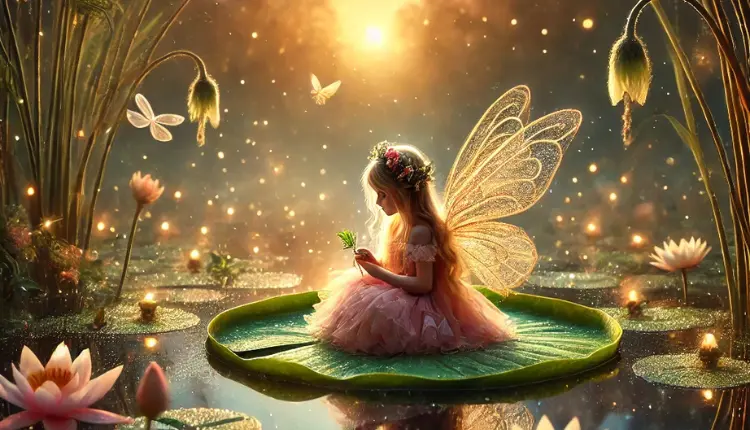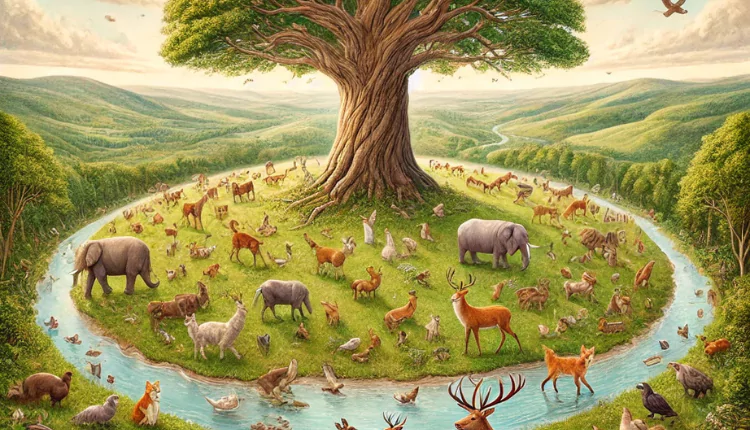Once in a village situated between lush meadows and green hills, in a cozy home decorated with flowers of all colours, there lived a woman whose heart had an emptiness that none could fulfil. She yearned for a child and, in her heartache, just gazed out the window, watching the sparrows feed their chicks. She wondered if she would ever get the joy of tending to something so dear.
One day, driven by this longing, she visited a wise old herbalist who lived on the edge of the village. The woman stooped with age yet sharp of eye, listened carefully and then handed her a small, wrinkled barleycorn seed. “Plant this in your garden,” the herbalist said with a knowing smile. “You might just find the treasure you seek.”
The woman returned home and did exactly as she was told, planting the seed in a clay pot by her window. By the very next morning, a green sprout had pushed through the soil, and by evening, a delicate bud had unfolded. With the first rays of dawn, the flower bloomed and revealed petals that shone like the sun, and to her amazement, in its centre sat a tiny girl, no larger than a thumb. The woman couldn’t help but gasp with wonder.
“I will call you Thumbelina,” she whispered as she gently lifted the child into her cupped hands. The little girl stretched her arms, yawning softly like the morning wind rustling through the reeds.
Thumbelina’s life, just like her personality, was full of small joys; she would dance on the broad lily leaves in ponds, wove petal dresses, and, at night, sing the sweetest songs. Her mother adored her and loved her to bits, but one of her biggest worries was Thumbelina’s safety in a world so big and full of dangers.
One summer’s night, when the stars shone like scattered diamonds, a large, warty toad hopped into the garden. He spied Thumbelina asleep in her walnut-shell cradle. “What a lovely wife she would make for my son!” croaked the toad, his bulging eyes gleaming with mischief.
Without a sound, the toad scooped up Thumbelina, cradle and all, and carried her to the edge of a wide, murky pond. There, he placed her on a floating lily pad and called for his son, a sullen, sluggish creature with eyes as dull as mud.
When Thumbelina woke and saw where she was, her heart sank. The toad’s son croaked a greeting, and the father proudly announced, “You shall live here among the reeds, and soon you’ll marry my son!”
“What! I don’t want to get married, let alone to him,” Thumbelina protested with a trembling voice. Her spirit, however, did not waver. Her sorrowful voice made even the fish take pity on her. One of the fishes thus secretly came to the surface and gnawed at the stem of the lily pad Thumbelina stood on. Suddenly, it snapped and carried the girl away, her heart coming at ease after escaping the horrible toad’s clutches.
As Thumbelina floated, a passing beetle with gleaming black wings caught sight of her. Enchanted by her delicate beauty, he swooped down and lifted her from the lily pad. Thumbelina was startled, but she thanked the beetle for rescuing her.
“Rescue? Hahaha,” he laughed. “The only reason I have brought you here is that you’ll make a fine addition to my company. Wait till you meet all my beautiful friends.”
The beetle introduced her to his friends: a group of insects with shiny polished shells and soft feathery antennae. All of them gathered around her, curious.
“Her legs are too thin,” came one remark.
“And look, only two arms!” another sneered. Thumbelina blushed with embarrassment. For the first time, she felt her confidence shatter.
At once, the beetle who had brought her there, feeling the sting of his friends’ judgments, jumped in, “I thought you were beautiful, but clearly, I was mistaken.”
And Thumbelina was left alone in a strange forest. Though her heart ached, she reminded herself of the kind fish who had helped her escape the toad. Not all creatures were cruel; some are kind as well, she thought. She brushed away her tears and resolved to keep moving.
As autumn came, Thumbelina found herself alone, cold, and hungry. She roamed the land in search of food and shelter and, one day, came across a tiny field mouse who offered her shelter in her warm burrow.
“You can stay here in the winter, but you must help me with my home chores and manage my stores.”
Thumbelina was grateful and, hence, worked hard day and night to repay the mouse’s kindness. However, as the days shortened, the mouse began to pressure her into something she did not want to do.
“A wealthy mole lives nearby, and he has tunnels stuffed with food and treasures. You would do well to marry him.”
The mole was a good friend of the mouse; he visited often and always admired Thumbelina’s beauty. He was not a bad creature, but he had little love for sunlight, flowers, or nature. He used to say, “The world above is dangerous. One must stay below where it is safe.”
But Thumbelina longed for the warmth of the sun on her face and the rustle of leaves in the breeze. She could not imagine spending her life in the mole’s dark tunnels.
One day, while exploring the burrow, Thumbelina discovered a swallow lying motionless. His feathers were dull, and his breath was faint. Moved by compassion, she nursed him back to health, weaving a blanket of grass to keep him warm and singing songs to soothe him.
When spring returned, the swallow regained his strength. “Come with me,” he urged. “I’ll carry you far away from this dark place.”
Though she was grateful to the field mouse, Thumbelina knew she could not stay. So, she climbed onto the swallow’s back, and together, they soared into the bright, open sky.
The swallow carried Thumbelina to a land unlike any she had ever seen, a meadow filled with rainbow-coloured flowers, and in the heart of each bloom, there lived a tiny person, just like her! The swallow was, apparently, a special friend of the prince of the land. Thus, she took Thumbelina to a blossom that was the home of the young prince.
Seeing her, the prince was charmed by the simplicity of the girl. He allowed her to live there and gave her a place in the bustling village. There, he observed her for days and months. It came to his knowledge that Thumbelina was wise beyond her years; she knew all kinds of crafts and possessed a heart of gold that could not bear to see anyone in pain. And finally, one day, the prince approached her.
“You are the most joyful and radiant being I have ever seen,” said the prince, bowing low. “Will you stay here and be my queen?”
Thumbelina was overcome with joy. Not only did she find a place where she truly belonged, but she also found people who cherished her. She accepted the prince’s proposal, and he gently placed a delicate crown on her head. Then, to her surprise, the prince cast a magic spell and gifted her a pair of wings so she could flit from flower to flower.
And so, Thumbelina lived happily ever after, a queen of the flowers, yet forever mindful of the little things that had brought her to her kingdom.
Lessons from “Thumbelina”: Courage and Kindness
The retold version of Thumbelina gives readers a similar charming experience as does the original story. This short bedtime story is a beautiful amalgamation of the themes of kindness, courage, and staying true to oneself. In the story, Thumbelina, a tiny girl born from a flower, faces many challenges, like being taken by a toad, escaping a mole’s underground world, and braving the unknown to find where she truly belongs.
This short bedtime story teaches us that even the smallest and most delicate among us can be incredibly brave, just like Thumbelina’s gentle nature and inner strength guiding her through each obstacle until she finds a life and love that reflect her true spirit. The message of this story is one that both children and adults can hold onto: stay kind, stay strong, and you will bloom in your own time.
Reading short bedtime stories for kids, like Thumbelina, helps young readers develop empathy, emotional resilience, and a sense of wonder. These bedtime stories short in length are perfect for holding children’s attention while delivering powerful life lessons in an interesting way.
But the benefits don’t end with children; short bedtime stories for adults offer a calm, reflective space at the end of the day. A gentle, imaginative tale like Thumbelina can soothe stress, inspire thought, and revive the comfort of simple storytelling. And whether shared aloud or read quietly, short bedtime stories nurture a deeper connection with values and imagination. Finally, Thumbelina reminds us that no matter how small we may feel, we all have the power to choose our path, follow our heart, and grow where we are loved and appreciated.
So, next time you seek a story with heart, Thumbelina is the perfect short bedtime story to light up your night with hope.
Searching for gentle bedtime stories that can turn the end of the day into a magical adventure?
Step into a world where each night unfolds with wonder and warmth. Our collection of Bedtime Stories on Storyious is designed to create a peaceful ritual, easing little ones into the realm of dreams. With tender narratives and delightful characters, these gentle bedtime tales help quiet the mind and soothe the spirit. You can enjoy moments of togetherness as you explore enchanting plots and soft adventures that spark imagination without overwhelming. Let these stories be the comforting whisper that guides your children gently into a night filled with sweet dreams and creative reveries.







Comments